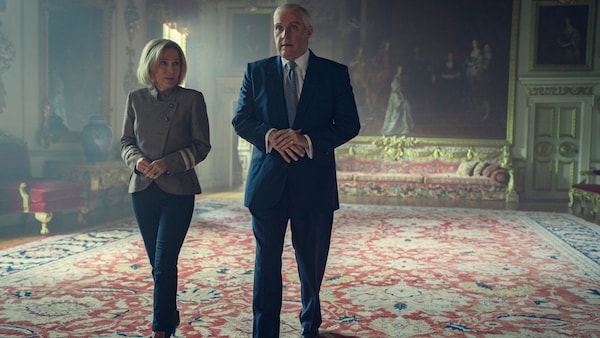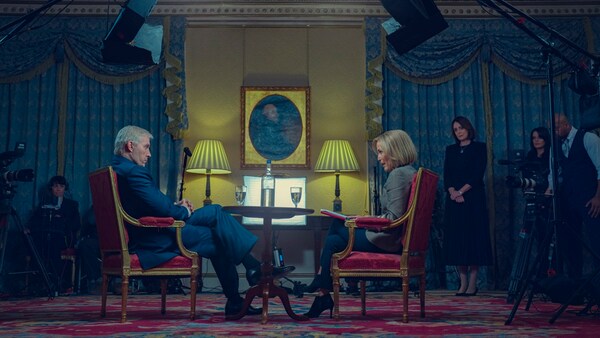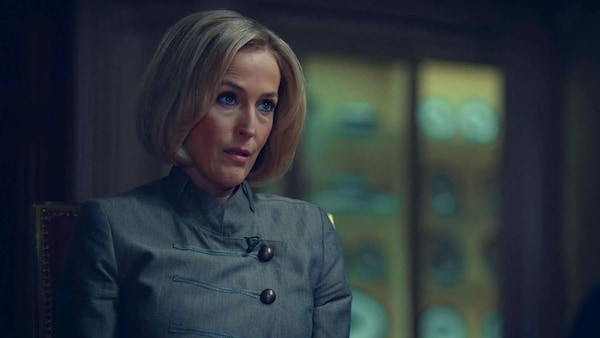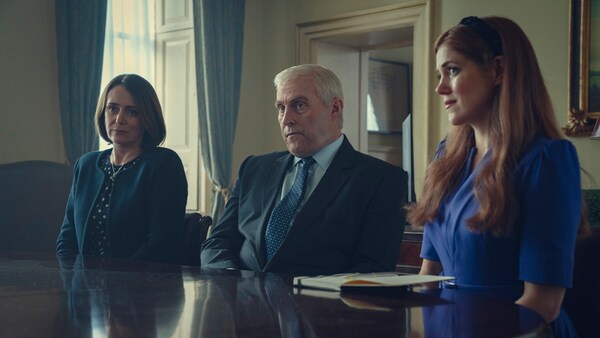Scoop: The Netflix Thriller Expands The Stylebook Of A Journalism Movie
This is #CineFile, where our critic Rahul Desai goes beyond the obvious takes, to dissect movies and shows that are in the news

Last Updated: 05.31 PM, Apr 06, 2024
NOT FOR THE FIRST TIME, Gillian Anderson sits on a chair in Buckingham Palace and asks tough questions of the British monarchy. After playing Margaret Thatcher in Season 4 of The Crown, the American actress appears in the Peter Moffat-written Scoop as Emily Maitlis, the BBC Newsnight anchor who grills Prince Andrew about allegations of his sexual assault and his ‘friendship’ with Jeffrey Epstein in that 2019 television interview. The programme became the catalyst for the downfall of “the Queen’s favourite son” — with Maitlis’ firm questions and reactions shaping the language of an internet-era trial. Anderson is pitch-perfect as a no-nonsense newsreader who atones for her complicity (“I didn’t ask Clinton about Lewinsky”) by conducting an interview that unfolds like an action set piece featuring words and pauses. She navigates the tricky terrain of being fair to her interviewee while letting him — an embattled man out to renovate his public image — do the unravelling.

But Emily Maitlis is not the focus of Scoop — the miniseries A Very Royal Scandal (2023) already told this story through the lens of her life. Scoop, instead, is more of a conventional journalism movie. It’s a newsroom procedural of sorts, a behind-the-scenes retelling of the negotiations between the female-led channel and the female-guided Palace — and the eventual securing of the scoop. If there is a perspective, it belongs to BBC producer and “master booker” Sam McAlister (Billie Piper), whose book Scoops: Behind the Scenes of the BBC’s Most Shocking Interviews serves as the source material for this film. Sam is the one who sets the ball rolling by establishing a connection with Andrew’s private secretary, Amanda Thirsk (Keeley Hawes). What follows is a taut cocktail of Spotlight and She Said, where the urgency of the process gradually reveals the enormity of the cultural moment. If it’s a bit self-congratulatory, that’s only because the media seems to be interrogating its own respect and awe for the Crown.

Scoop does the basics well. I like that Sam is the “in”: She exudes the crisis of a tabloid reporter hired by a traditional outlet to increase their reach. She wants to be one of them and fit in, but there’s an air of condescension around her; she is not ‘serious’ enough for them. In a way, her equation with the BBC replicates the central theme of the film: The organisation is the snooty (media) monarchy, and she is their unscheduled wake-up call. With a round of layoffs going on, Sam’s defiant impulses — of smelling a story and letting her identity as a single mother do the rest — lend a lingering edge to the film. When Emily and her editor Esme (Romola Garai) begin to follow her lead(s), it almost mirrors the ice-breaking journey between Sam and Prince Andrew’s aides. I also like that the aftermath of the interview is not too theatrical. The way the conversation unfurls at the Palace ties into the way it is consumed — and processed — by social media. Every fumble makes us squirm, because we can imagine the memes and criticism it will trigger. But it is by no means a one-sided barrage; one almost can’t blame Andrew and his entourage for being satisfied with his responses.

There’s also the very careful humanisation of the royal himself, a man whose charisma has long deflected any doubts of his involvement in the Epstein racket. Rufus Sewell is not just unrecognisable as Andrew, he is also surprisingly vulnerable. Yet, it’s not sympathy but culpability that we feel; it’s like watching an errant child being cornered by adult cops. You believe that he believes — through delusions of power and masculinity — that he’s done a good job of defending himself. He is not overly villainous or sinister or all those things that predators tend to be in stories featuring them; as a result, it’s all the more startling to see him. The shot of Andrew standing butt-naked in front of a television airing his interview is a nice touch, too. He is stripped of all dignity in the warm confines of his own bedroom.

Of the supporting cast, Keeley Hawes stands out as Amanda Thirsk, especially because her loyalty to Andrew is actually crumbling beneath her facade. She almost wants her boss to expose himself and liberate her from the burden of protecting (and caring for) him; she feels sorry for the way he does it. When she advises him, it sounds a bit like a mother slowly freeing herself from the responsibility of a problematic son. Her face during the interview is a study of disappointment and relief at once — it’s a complex performance in a film seeking to deconstruct its greys into post-MeToo blacks and whites. In the end, there’s a very un-English embrace of sentimentality: A speech in a newsroom, an ode to working-class rigour (the purchase of lamb shawarmas of course), and a nobody-but-everyone-wins postscript. Scoop reaches for the old stylebook, but refuses to compromise on its big headline. It doesn’t mind being the second or third draft of history — as long as it’s not just the news that’s broken.

 Premium
Premium